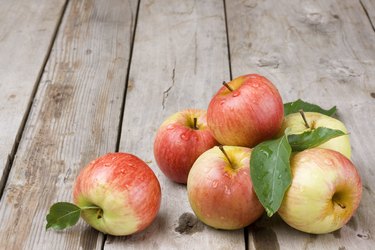
You don't have to repress your love for apples when you decide to try a low-carb diet. Depending on the plan you choose, though, you will likely avoid all fruit for at least the first few weeks of the program. After that, pay attention to the number of carbs in different types of apples so you stay within your dietary allotment of carbohydrate.
Tip
You can eat apples on a low-carb diet, but you may not be able to include them until you've completed the initial phase of your diet, which for many low-carb plans is the first two to three weeks.
Video of the Day
How Low-Carb Diets Work
The National Academies of Science recommends adults get 45 to 65 percent of their calories from carbohydrate, which amounts to 225 to 325 grams on a daily 2,000-calorie diet. The NAS also sets 130 grams as "adequate intake," or the minimum amount you should have every day for good health. If you don't follow a set diet, a range of between 50 and 150 grams of carbohydrate a day qualifies as "low carb," according to a review in the American Journal of Clinical Nutrition in 2007.
Video of the Day
Whether do-it-yourself or established, a low-carb diet requires counting grams. On the Atkins 20 diet, you consume no more than 20 grams of net carbs in a day during the induction period, which can last two or more weeks. In Atkins 40, a less restrictive plan, you limit yourself to 40 grams a day. You calculate "net" carbs by subtracting the grams of fiber and sugar alcohols in a food from its total number of carb grams.
When you're only eating 20 or 40 grams of carbs a day, only certain kinds of produce — primarily non-starchy vegetables — fit the bill. Fruits, which are higher in carbs, come into play after you've lost some initial weight and can allow yourself a higher daily net carb count.
Fruit in a Low-Carb Diet
Most low-carb diets restrict your fruit consumption during the initial period of adjustment to the diet. Atkins 20 diet allows you to start adding fruit in Phase Two, which begins when you are 15 pounds from your target weight – a period that can last two or more weeks. However, the fruits you add in are melon, berries and cherries, which are the lowest in net carbs. When you are 10 pounds from your weight-loss goal, you shift into Phase Three of Atkins, during which you can eat any fruit you like as long as you stay within the range of 50 to 80 grams of net carbs a day.
On Atkins 40, you can eat any fruit from the first day of the diet. South Beach, another popular low-carb diet, allows you to eat all fruits after you've completed the first two weeks of the plan.
Carbs in Apples
The number of grams of net carbs in a small apple varies slightly with the type you choose. Yellow and green apples like golden delicious and Granny Smith may be your best bets, with 15 and 16 grams of net carbs, respectively. Gala and red delicious apples come in at about 18 grams of net carbs, while Fuji is at the high end, with 21 grams. Leave the skin on your apple to increase its fiber content. Also, eating your apples in the form of applesauce makes them high carb; a cup of unsweetened applesauce contains 25 grams of net carbs. Dried apples have 34 grams of net carbs in a cup.
Eating Apples on a Low-Carb Diet
Avoiding apples for the length of your diet — or for life, if you decide to make low-carb eating permanent — may not be feasible for you, particularly if you love their taste and crunch. Depriving yourself can backfire and lead to derailing your goals. Instead, wait until you're up to at least 50 grams of net carbs a day before you start adding apples into your regimen. Control your net carbs and boost an apple's satiety by enjoying half a fruit with a tablespoon of almond butter or cream cheese; either adds only 1 gram of net carbs to your snack while also offering fat, and in the case of almond butter, a bit of protein.